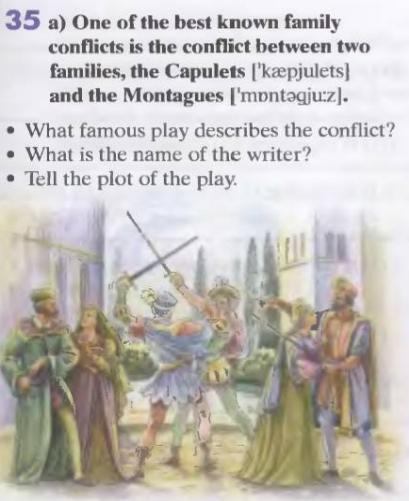Сибилева Анна Викторовна, e-mail: [email protected], Красноярский край, г. Бородино МБОУ СОШ №3
«Шекспировский урок».
ENGLISH
William Shakespeare - The tragedy of Romeo and Juliet
‘For never was a story of more woe
Than this of Juliet and her Romeo.’
By William Shakespeare
Topic: Conflict Resolution
Aims:
• Learners will practise listening skills
• Learners will use critical thinking skills
• Learners will practise using functional language to resolve conflicts in a peaceful way
• Learners will practise writing skills
Age group:
Teens(14 years old)
Time:
45 minutes
Materials:
• Video from Learn English Teens http://learnenglishteens.britishcouncil.org/uk-now/literatureuk/
Shakespeare- Romeo and Juliet
• student worksheet; the picture from “Enjoy English 9” written by Biboletova M.Z.
Introduction:
In this lesson, students will discuss the idea of resolving family conflicts, and watch a video about Shakespeare’s
play “Romeo and Juliet”. Students will check their understanding of the plot and characters in the play, and then work
together to ask for and give advice to the main characters.
Procedure
| Time | Parts of the lesson | Pupils ’ tasks | Teacher’s tasks | Pupils ’activity | Teacher’s activity | Results |
| 2 minutes | Warming-up | To guess and answer the questions | To involve Pupils’ interest to the topic and get them suggesting the ideas | Pupils try to guess and suggest their ideas | Teacher asks Pupils to look at the picture and answer the questions: | Pupils name the author and the play. |
| 5 minutes | Telling the plot of the play | To develop speaking skills | To cheer up Pupils’ speaking | Pupils tell their versions of the story | Teacher asks if the pupils know what are the main characters of the play and offers to watch the video about Romeo and Juliet | Pupils told the plot of ‘Romeo and Juliet’in brief. |
| 7 minutes | Introducing the theme | To develop listening skills; to learn emphasizing feelings | To help the pupils to understand the beauty of a real love | Pupils watch the video | Now Teacher offers to discuss what the cause of that tragedy was and how their families could have prevented such a dreadful final. |
|
| 15 minutes | Group work | To brainstorm the ideas | To organize work in groups | Pupils choose who will be the Capulets, who will be the Montegues, and who will be experts. | Teacher asks Pupils to divide into three groups according to their preferences and use the student worksheets for writing down their thoughts. | Pupils discussed and compared problems between families in Shakespeare’s play and in a modern life |
| 10 minutes | Presenting the ideas | To learn to hear different people’ opinions |
To teach to be tolerant and able to resolve conflicts peacefully | Each member of the groups takes part in the discussion how to stop tragedy. | Teacher asks the families to present their problems. Then Teacher asks experts present their resolutions on the problems. | Pupils learned how to resolve conflicts in a peaceful way |
| 5 minutes | Rewriting the end of the story | To develop creativity and writing skills | To develop creativity and writing skills | Pupils write their own endings of the play. | Teacher wonders what the end of the play would have been written by William Shakespeare and asks pupils to put it down in their sheets. | Pupils wrote alternative endings of the play |
| 1 minute | Background | To think about reading Shakespeare’s plays | To develop pupils’ reading skills | Pupils discuss the idea of reading Shakespeare’s plays | Teacher advises Pupils to find other conflicts in Shakespeare’s plays and resolve them at the next lessons. | Pupils want to read Shakespeare’s plays |

 Получите свидетельство
Получите свидетельство Вход
Вход













 Методическая разработка плана Шекспировского урока : "Conflict Resolution" для учащихся 9-х классов (470.9 KB)
Методическая разработка плана Шекспировского урока : "Conflict Resolution" для учащихся 9-х классов (470.9 KB)
 0
0 61
61 3
3 Нравится
0
Нравится
0


